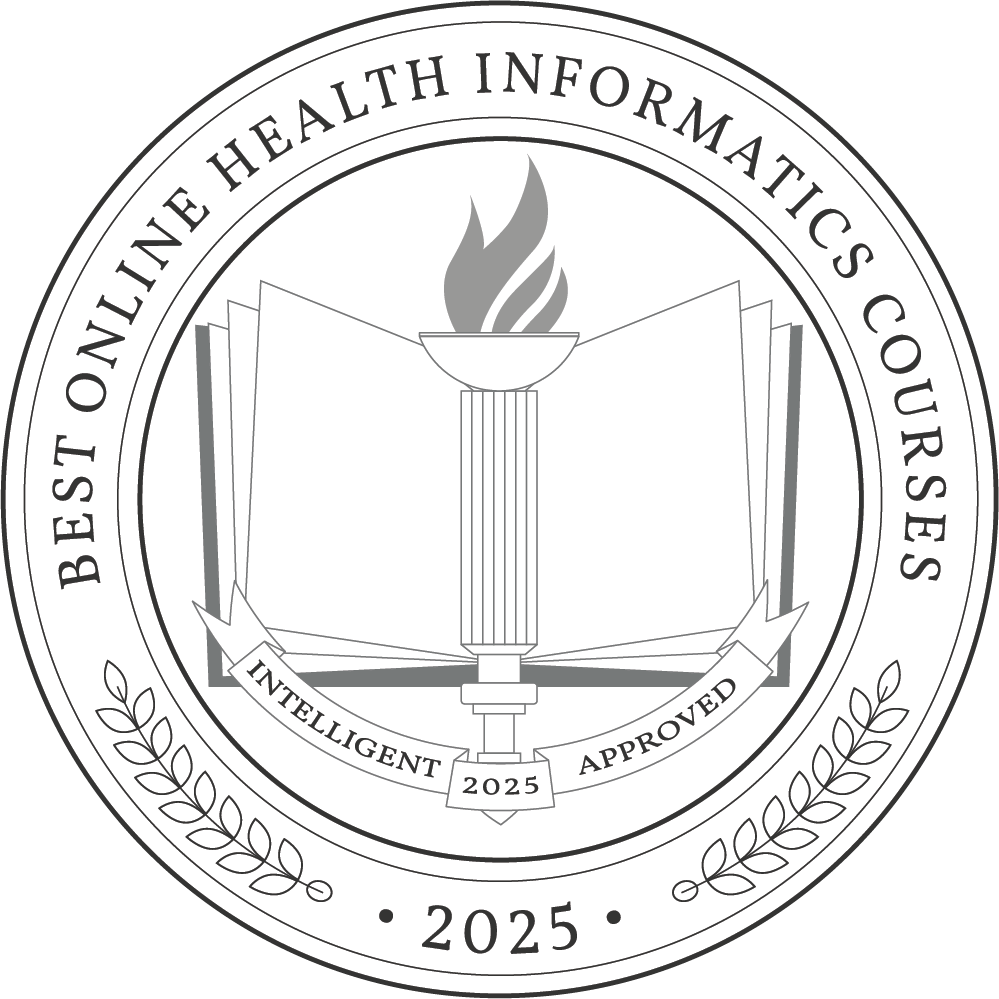Taking an online health informatics course can be a great way to pursue a career in the healthcare industry with a marketable, in-demand skill. Not all online courses meet the highest standards. Spending your money on one that will teach you the right skills and provide the credentials you need is important. We’ve reviewed the best online health informatics courses to reach these top seven.
- Coursera — Health Informatics Specialization by Johns Hopkins University — Top Pick
- Coursera — AI in Healthcare Specialization by Stanford University — Most Advanced
- Coursera — The Data Science of Health Informatics by Johns Hopkins University — Most Flexible
- Coursera — Healthcare IT Support Specialization by Johns Hopkins University — Best Professional Outcomes
- edX — Health Informatics on FHIR — Most Specialized
- Udemy — Understanding and Complying with HIPAA — Shortest Course
- Udemy — CompTIA Healthcare IT — Best for Beginners
Our Ranking Criteria
The best online health informatics courses are well-produced, and engaging, and provide real-world skill sets you can bring to your job. We narrowed down your options based on several key factors, including criteria applicable to all online courses, and those unique to health informatics courses.
Basic Ranking Criteria
The first thing to consider when looking into an online course is whether or not the structure of the course will align with your schedule and study habits. It’s also important to find out if there are any prerequisite courses you need to take first. With that in mind, we considered the following four criteria when putting together our list.
Time to complete. First, we ensured that all the courses we included could be completed in a reasonable timeframe. While that may vary depending on the complexity of the material, the majority of the courses on our list can be completed in less than four months.
Prerequisites required. None of the courses on our list have strict prerequisites, but some may assume a working knowledge of the healthcare industry. We’ve noted which type of participant each course is geared towards.
Flexible schedule. Many people take online courses because they have a busy schedule and can only study at night or on the weekends. We’ve made sure most of the courses on our list have a flexible schedule and don’t require you to attend at specific times.
Certificate of completion. Finally, we’ve made note of whether or not the course includes a formal certification. While not all courses do, this is important to look for if you plan to apply for a job requiring a specific credential.
Advanced ranking criteria
The above criteria can be used to compare nearly any online class, but there are other factors you may want to consider before choosing a health informatics course. We used the following advanced ranking criteria to compile our list.
- The course focuses on a specific area of health informatics or offers a broad overview that’s suitable for beginners.
- The course is taught by university-level professors or instructors with firsthand experience in the industry.
- The course includes interactive content, such as quizzes or exercises, to help you learn the material.
- The course has positive ratings and reviews (at least 4 stars).
- The course was produced within the last 5 years or updated recently to address the latest trends in health informatics.
- The course suits job seekers new to the industry, or those who want to advance an existing career in healthcare or IT.
- The course includes transcripts and subtitles for easier study.
The 7 Best Online Health Informatics Courses
Coursera
Health Informatics Specialization by Johns Hopkins University
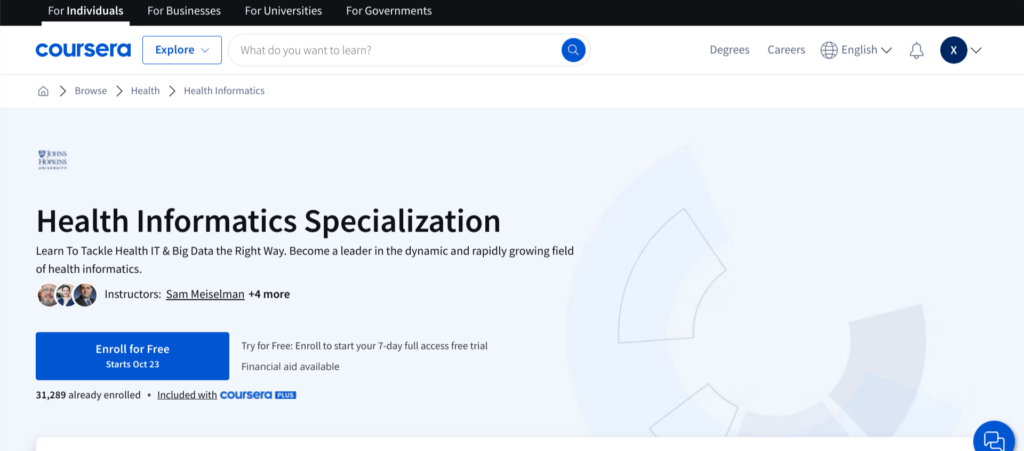
Intelligent Award: Top Pick
This course is offered by Johns Hopkins University and covers topics such as digital health, data science, decision analysis, and more. It takes about one month to complete, with a recommended workload of 10 hours per week. There are no official prerequisites. It’s suitable for beginners, but the instructors suggest some previous experience with healthcare and technology topics. You’ll also be expected to complete a hands-on project. Enrollment is free, but it costs $49 per month to access all the material and receive a verified certificate. This course is included with Coursera Plus, and financial aid options are available for some students. Its affordability, comprehensive syllabus, and university-level instructors make it the top choice on our list.
- Price: $49 per month
- Time to complete: 1 month (at 10 hours per week)
- Prerequisites required: No
- Flexible schedule: Yes
- Includes verified certificate of participation: Yes
Who should take this course? This course suits anyone in the health or IT industry, including staff, administrators, vendors, and other professionals.
| What we like | What we don’t like |
| Backed by a major university | Focuses on U.S. healthcare only |
| Hands-on project work | Some errors and misspellings |
| Subtitles in multiple languages |
Coursera
AI in Healthcare Specialization by Stanford University
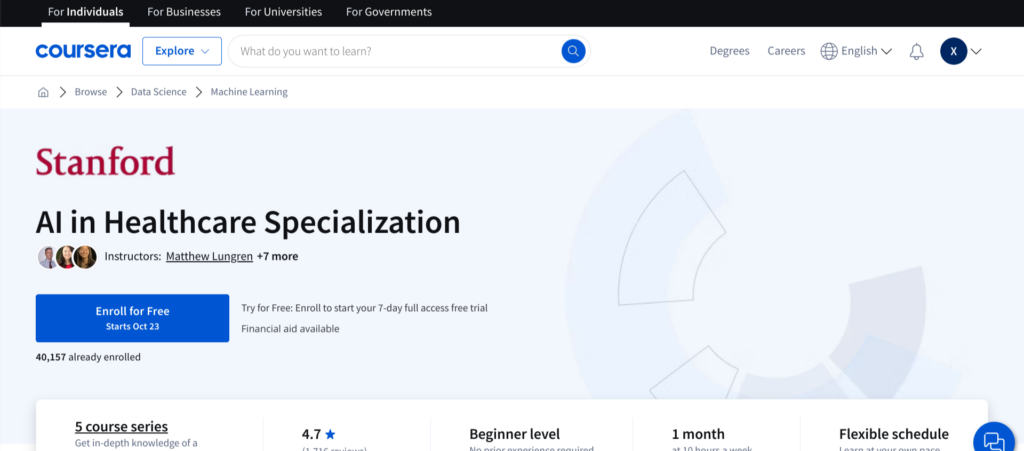
Intelligent Award: Most Advanced
The AI in Healthcare Specialization is offered by Stanford University and is one of the most advanced courses on our list. It comprises five smaller courses, all with a 4.5-star rating or higher. You’ll learn about AI and machine learning strategies to improve patient care and health outcomes and then complete a hands-on capstone project that follows a patient’s healthcare journey. This specialization takes one month to complete at a pace of 10 hours per week.
- Price: $79 per month
- Time to complete: 1 month (at 10 hours per week)
- Prerequisites required: No
- Flexible schedule: Yes
- Includes verified certificate of participation: Yes
Who should take this course? This course is aimed at computer science and healthcare professionals and focuses on the connections between the two fields.
| What we like | What we don’t like |
| Backed by Stanford University | Typos in quizzes and assignments |
| Comprehensive syllabus | |
| Subtitles in multiple languages |
Coursera
The Data Science of Health Informatics by Johns Hopkins University
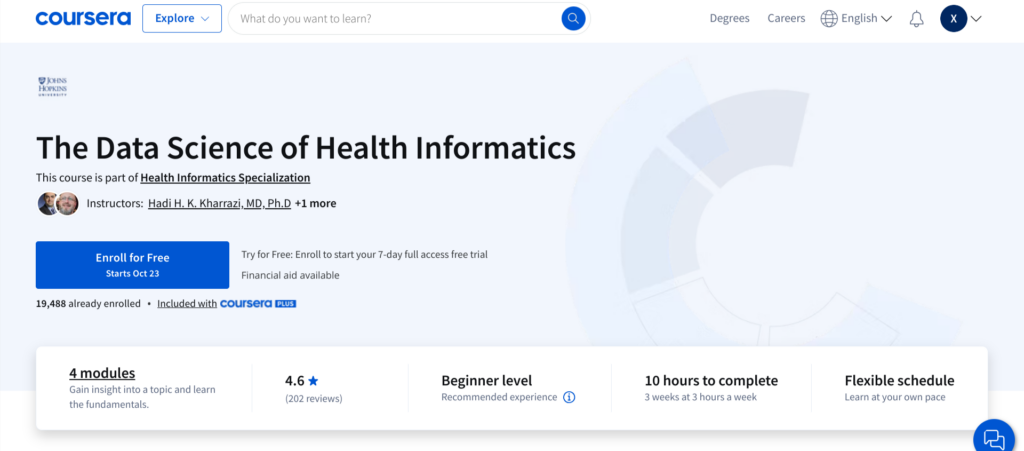
Intelligent Award: Most Flexible
This course is part of the Health Informatics Specialization by Johns Hopkins University, but it focuses specifically on data science and analyzing electronic health record (EHR) data. The course takes around 10 hours to complete, and you can reset deadlines to better align with your schedule. You don’t have to take any other courses in the series, but some experience with healthcare data and statistics is recommended.
- Price: $49 per month
- Time to complete: 10 hours
- Prerequisites required: No
- Flexible schedule: Yes
- Includes verified certificate of participation: Yes
Who should take this course? This course is ideal for those who want flexibility, as it features no prerequisites, flexible deadlines, and multilingual subtitles.
| What we like | What we don’t like |
| Flexible deadlines | No university credit |
| Graded quizzes and assignments | No hands-on project |
| Subtitles in multiple languages |
Coursera
Healthcare IT Support Specialization by Johns Hopkins University
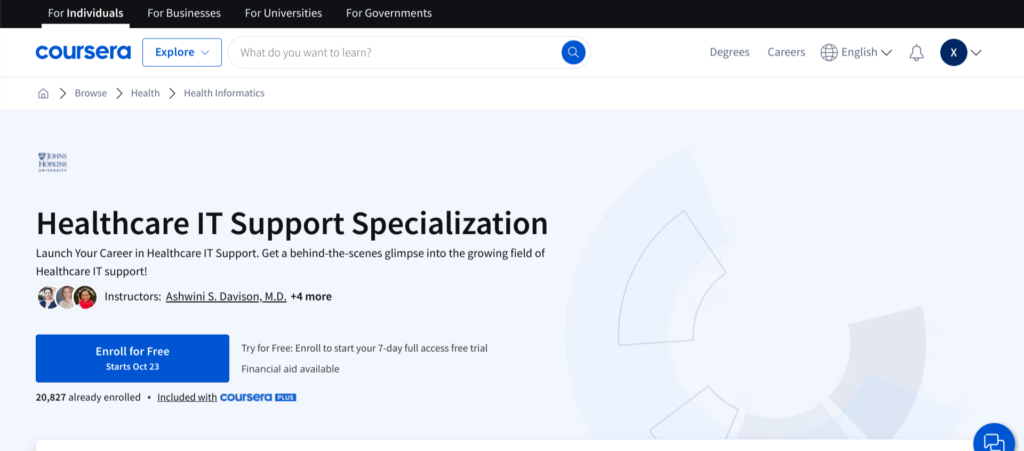
Intelligent Award: Best Professional Outcomes
This course is specifically designed for those who want to pursue a career in healthcare by providing IT support to healthcare professionals. You’ll learn about clinic and hospital operations, as well as how to work with doctors, nurses, pharmacists, and other health specialists. Other topics include privacy and data security. This course takes around one month to complete, with a workload of 10 hours per week. The university-level curriculum and career-oriented projects make this the best course on our list for professional outcomes.
- Price: $49 per month
- Time to complete: 1 month (at 10 hours per week)
- Prerequisites required: No
- Flexible schedule: Yes
- Includes verified certificate of participation: Yes
Who should take this course? This course is best for professionals with some healthcare or IT experience who want to become IT support specialists in the healthcare industry.
| What we like | What we don’t like |
| Backed by a major university | Teaching styles vary |
| Flexible schedule | |
| Hands-on projects |
edX
Health Informatics on FHIR by Georgia Tech
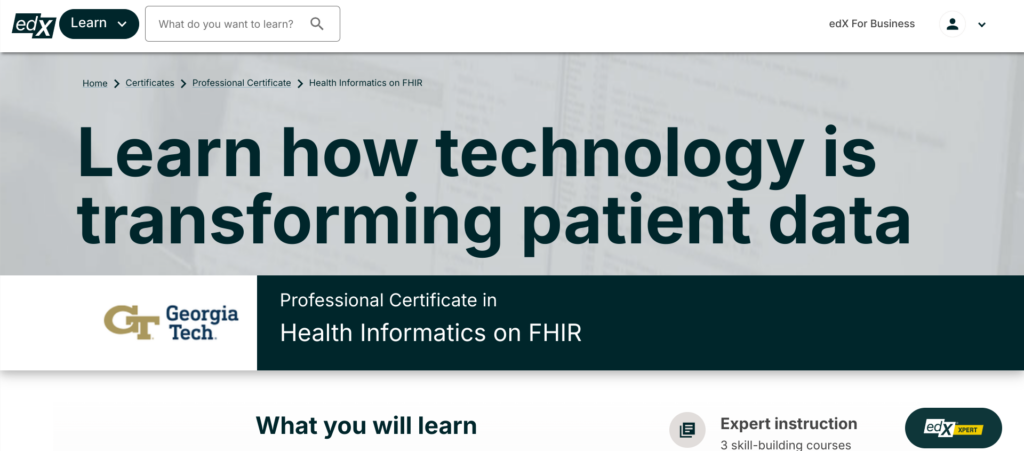
Intelligent Award: Most Specialized
This course is offered by Georgia Tech and takes around four months to complete, with a workload of around 10 to 11 hours per week. You’ll start with an overview of health informatics from a “current and historical perspective,” then move on to interoperability standards and the “cutting edge” of health informatics technology. This is the only course on our list to focus on Fast Healthcare Interoperability Resources (FHIR), emphasizing the U.S. healthcare system. It costs $297 to participate in all of the modules and receive a certificate of completion. The program is endorsed by Rimidi, a company that develops FHIR apps and claims the certificate would give jobseekers a clear competitive advantage.
- Price: $297
- Time to complete: 4 months (at 10 to 11 hours per week)
- Prerequisites required: No
- Flexible schedule: Yes
- Includes verified certificate of participation: Yes
Who should take this course? This course is best for those who want to focus on a specific area of health informatics (FHIR) and receive an industry-recognized certificate.
| What we like | What we don’t like |
| Backed by Georgia Tech | High workload |
| Endorsed by FHIR developers | Focus on the U.S. healthcare system |
Udemy
Understanding and Complying with HIPAA
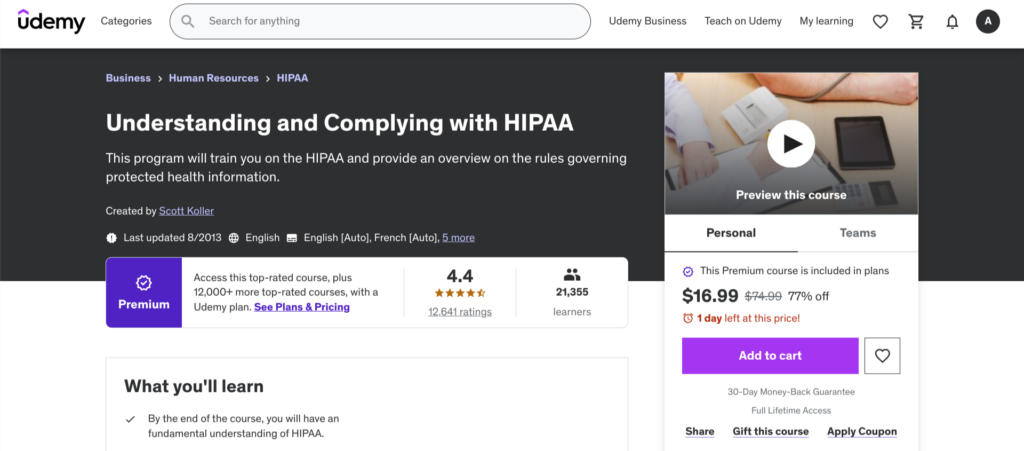
Intelligent Award: Shortest Course
At only 37 minutes long, this is the shortest course on our list, but remember it only addresses HIPAA compliance. If you want to learn the basics of HIPAA (which stands for Health Insurance Portability and Accountability Act), then this is the course for you. You’ll learn about security best practices, such as encrypting documents or responding to a security breach, and look at real-world examples of HIPAA violations. This course is taught by an attorney, so you can expect a mix of technical and legal content, but you don’t need any prior experience in the field.
- Price: $74.99
- Time to complete: 37 minutes
- Prerequisites required: No
- Flexible schedule: Yes
Who should take this course? This course isn’t just for healthcare or IT professionals. It’s suitable for attorneys, security professionals, business associates, and anyone else who comes into contact with confidential health information.
| What we like | What we don’t like |
| Affordable price | Narrow focus |
| Concise syllabus | No certificate |
Udemy
CompTIA Healthcare IT
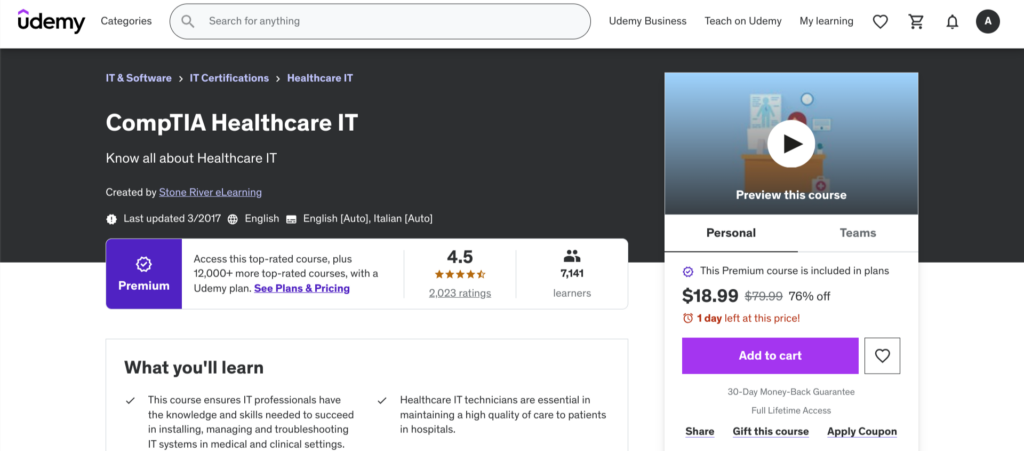
Intelligent Award: Best for Beginners
This course provides four hours of content covering regulatory requirements, medical business operations, healthcare IT, and more. It was last updated in 2017, so it isn’t as up-to-date as some of the other options on our list, but it provides a thorough overview of the material and can prepare you for more advanced classes down the line. The course is based on the Computing Technology Industry Association’s (CompTIA) best practices and will give you the skills you need to navigate a hospital environment.
- Price: $79.99
- Time to complete: 4 hours 10 minutes
- Prerequisites required: Yes
- Flexible schedule: Yes
Who should take this course? This course is ideal for beginners since it offers an introduction to clinical classification and coding, troubleshooting healthcare IT systems, and more.
| What we like | What we don’t like |
| Affordable sale price | No certificate |
| Flexible schedule | Dated course material |
Online Course Comparison Chart
| Course | Price | Features |
| Coursera — Health Informatics Specialization by Johns Hopkins University — Top Pick | $49 per month | ✓ No prerequisites required
✓ Flexible schedule ✓ Verified certificate |
| Coursera — AI in Healthcare Specialization by Stanford University — Most Advanced | $79 per month | ✓ No prerequisites required
✓ Flexible schedule ✓ Verified certificate |
| Coursera — The Data Science of Health Informatics by Johns Hopkins University — Most Flexible | $49 per month | ✓ No prerequisites required
✓ Flexible schedule ✓ Verified certificate |
| Coursera — Healthcare IT Support Specialization by Johns Hopkins University — Best Professional Outcomes | $49 per month | ✓ No prerequisites required
✓ Flexible schedule ✓ Verified certificate |
| edX — Health Informatics on FHIR — Most Specialized | $297 | ✓ No prerequisites required
✓ Flexible schedule ✓ Verified certificate |
| Udemy — Understanding and Complying with HIPAA — Shortest Course | $74.99 | ✓ No prerequisites required
✓ Flexible schedule X Verified certificate |
| Udemy — CompTIA Healthcare IT — Best for Information Security | $79.99 | X No prerequisites required
✓ Flexible schedule X Verified certificate |
Tips for Succeeding in an Online Health Informatics Course
1. Consider the cost
How much do online health informatics classes cost?
The cost of an online health informatics course can vary widely. If you take a course on a platform like Coursera, you’ll pay a subscription of $49 – $79 per month, rather than a flat fee. Other courses are free to attend, but charge a fee if you want a verified certificate of completion. The most expensive course on our list costs $297 and takes around four months to complete.
Will my employer pay for me to take the course?
Some employers have an educational fund or an agreement to reimburse employees for professional development expenses. Whether or not your employer will pay for a health informatics course may depend on how important the skills are to your job. If you aren’t sure, ask your boss or HR department before enrolling in the course.
2. Get your tech squared away
You shouldn’t need any special equipment to complete your online health informatics course, but you’ll need a reliable Internet connection and a computer that can stream video. If you want to pause or rewind a lesson more easily, try installing a browser extension such as the Video Speed Controller for Chrome.
3. Use the right study resources
Your course might include a reading list or other downloadable resources, but it’s still a good idea to do your own research. You can stay up-to-date on industry trends with Healthcare Digital Transformation or get a broad overview of the subject with Fast Facts in Health Informatics for Nurses, both available in print or digital format.
Frequently Asked Questions About Health Informatics Courses?
What jobs can you get after completing a health informatics course?
A health informatics course can prepare you to be a chief medical information officer, a healthcare IT project manager, or a clinical analyst. Some health informatics jobs pay over $100,000 per year, but these typically require a master’s degree. Health information technicians, on the other hand, can be hired with a bachelor’s or associate’s degree and can expect to earn an income of $40,000 annually.
Are there free online health informatics courses?
Some online health informatics courses are free but may not include a certificate of completion. If you only want to learn the material and don’t need the credentials, then this may be an affordable option.
How long is the average online health informatics course?
That depends on whether you’re choosing a comprehensive course or a more specialized one. The longest course on our list takes four months to complete, with around 10 hours per week of study. The shortest course only takes 37 minutes, but this is strictly about complying with HIPAA and doesn’t include any other modules.
How do I get certified in nursing informatics?
To get certified in nursing informatics, you must have a bachelor’s degree, a nursing license, and two years of experience as an RN. You must complete 30 hours of continuing education and 2,000 hours of informatics nursing experience. An online health informatics course may count toward continuing education requirements.
Why should I study health informatics?
Health informatics professionals are in high demand and play a key role in improving healthcare IT systems. Professionals can earn a high salary while helping to reduce healthcare costs and provide a better patient experience.
Is health informatics a STEM degree?
Yes, health informatics is considered a STEM degree, and many university programs in health informatics have a STEM designation.
Interested in a degree instead?
Learn more about online degrees, their start dates, transferring credits, availability of financial aid, and more by contacting the universities below.
